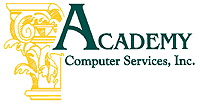|
CD Tower and Virtual CD Tower
Virtual CD/DVD Server
NAS
Networking
Legal Research Programs
Glossary
Downloads
Search
Email Us
Tel.: 800-385-6442
Fax: 781-279-4262
©2001 Academy Computer Services, Inc.
All rights reserved.
Terms & Conditions
|
Networking
Basic Security Tips
Create a Security Policy
- Keep notes. Before the system is set up, while still in the design stage, decide who should have access to what, and why they should
- Create and post a "Use Policy Statement". Detail what is allowed and what isn't. Rremember to include a clause that says that "anything not specifically allowed is denied". Explain how privileges will be limited or denied for violators. Have each user read and sign a copy of the statement. Keep the signed copies on file. Or use the features of NT Workstation to display this statement as part of the Logon process.
Protect the hardware
- Protect the BIOS with a password.
- Change the system to boot to C: only (avoiding the floppy). Change the floppy characteristic to Read-Only, to prevent virus introduction.
- Don't place a highly sensitive or important device in an insecure area. Someone will find a way to damage it.
- Lock the hardware down with a chain.
- Use a surge protector, UPS, or Line Conditioner to protect against electrical damage.
- Do regular disk maintenance (defrag the disk).
Protect the software and data.
- Do regular backups of sensitive data.
- Use Anti-virus software.
- Firewall all Internet access.
- Password protect screen savers and standby mode.
Don't create an environment where cheating is permitted.
- Place needed hardware in an accessible area. Don't place the only printer in a locked closet. It will only invite users to break rules to get work done.
- If security is so tight that users can't access everything they need to do their job, they will cheat to get work done. This just encourages the idea that hacking is condoned.
- Change passwords. Frequently.
Caveat Emptor: The more security you have, the more you need to maintain. Don't make extra work for yourself. If it doesn't need to be "locked down" - don't do it.
|
